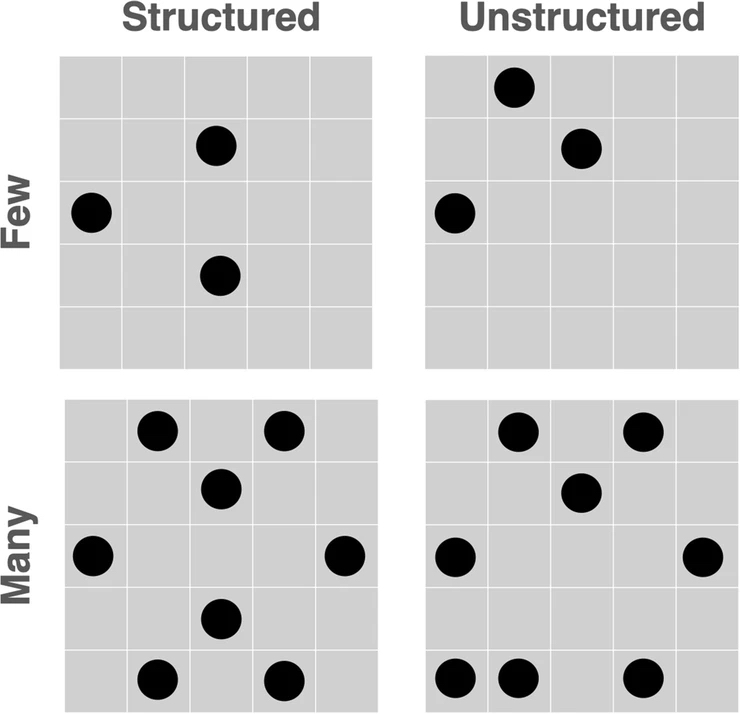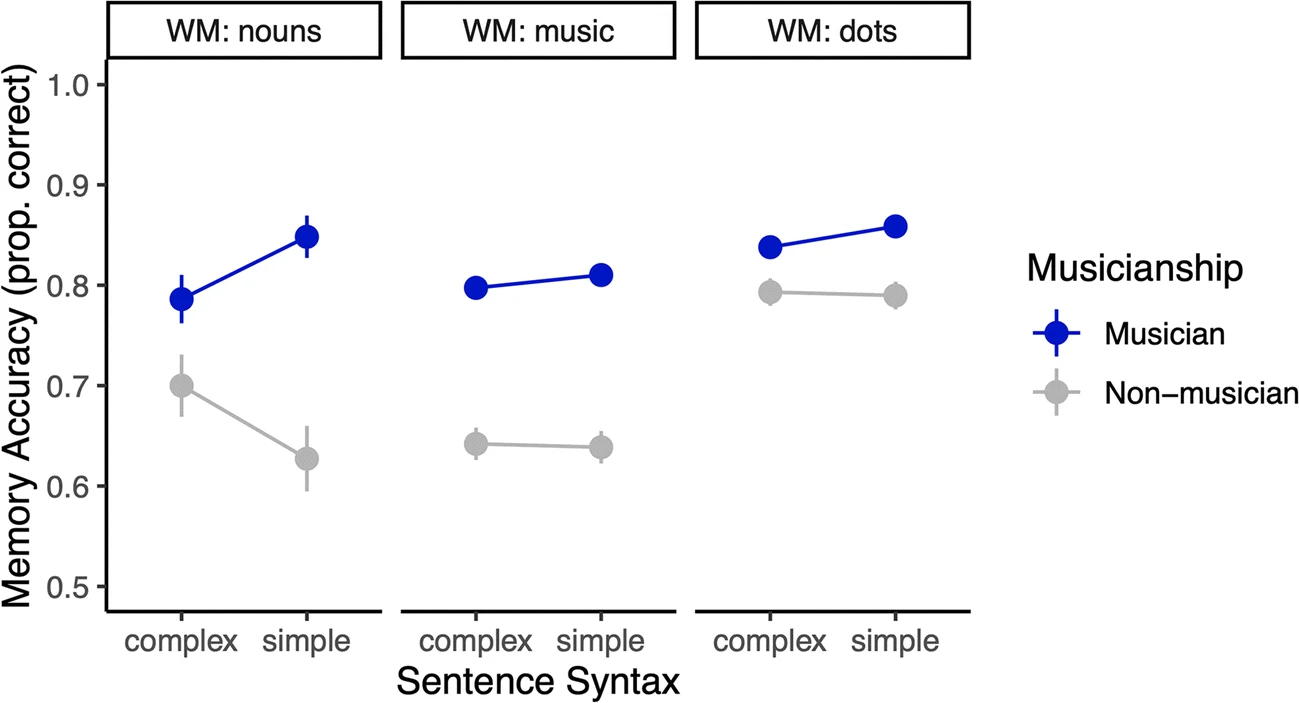Music and language share many cognitive features. Not surprisingly, it has been argued that they may have shared evolutionary origins and are present in every culture. I have a soft spot for cognitive studies in these two areas. When reading my earlier posts, you may notice that I covered topics such as bilingualism, the acoustics of emotions in the voice, and even slipped in references to iconic popular songs to illustrate concepts such as agency and behavioral regulation. I must confess that I could not resist the temptation of covering the featured article.
Musical training is related to advantages in linguistic skills, and while the cognitive mechanisms underlying this relationship are not fully understood, a prime candidate is working memory. If this perspective is correct, tasks that require working memory to process music interfere with tasks that require working memory to process language. This is the hypothesis that Anna Marie Fennell, Jennifer Bugos, Brennan Payne, and Elizabeth Schotter tested in their paper “Music is similar to language in terms of working memory interference,” recently published in the Psychonomic Society journal Psychonomic Bulletin & Review.
Probing how music interferes with working memory
To test their hypothesis, the authors adapted a dual-task working memory and sentence reading paradigm to test and compare the effects of linguistic, musical, and visual stimuli on working memory.
In the original task, participants tried to maintain verbal items in memory while reading sentences, after which comprehension of the sentences and retention of the verbal items are tested. In the adapted task, instead of verbal items, participants hold short musical excerpts or visual-spatial configurations in memory while reading sentences.
Because working memory is often assumed to process information using two systems, the phonological loop (processes verbal and auditory information) and the visuospatial sketchpad (processes visual information), the authors designed the experiment to compare whether the patterns of working memory interference caused by music behave similarly to the interferences caused by linguistic or visual stimuli. This allowed the researchers to probe the type of interference with working memory driven by music. In addition, they compared the performance of musicians vs. non-musicians.
This setup allowed the authors to test several hypotheses of theoretical interest, including whether
a) musical training increases working memory capacity (which would be reflected in better performance of musicians as compared to non-musicians),
b) whether such an increase, if observed, was present across all stimulus types (linguistic, musical, and visual) or was different depending on the nature of the stimuli.
Fennell and colleagues recruited 60 participants (~50% musicians), whose task was to read sentences of varying complexity such as “The violinist [who flattered the cellist/who the cellist flattered] played a piece from the symphony.” Note that the elements in brackets were optional and allowed to increase the phrase’s complexity as needed. After reading them, participants responded to syntactic and semantic questions. Here’s the catch: before reading the sentences, participants should retain in memory a stimulus (linguistic, musical, or visual), and after responding to the syntactic and semantic questions, they had to complete a recognition trial.
You can see examples of the three types of stimuli to retain in memory below. The linguistic stimuli included three nouns in a random order (semantically related to the phrase to read). The musical and visual stimuli varied in terms of their complexity (few or many elements) and whether they were structured (in musical terms, harmonic stimuli, in visual terms, geometric stimuli) or unstructured (in musical terms, dissonant stimuli, in visual terms, non-geometric stimuli).



The wonders of musical training
Here are some of their findings:
- Musicians performed better than non-musicians regardless of the type of stimuli to retain in memory (linguistic, musical, visual), suggesting that musical training has beneficial effects on working memory. The figure below shows that the musicians’ performance is always better than those of non-musicians.
- Music interfered with sentence processing similarly to language. This interference is observed by a higher accuracy in the task performance while retaining visual stimuli in memory than linguistic and musical stimuli. These differences also support the distinction between the phonological loop and visuospatial sketchpad.
- Musicians’ performance was less affected than the performance of non-musicians by processing linguistic information while holding linguistic and musical stimuli in working memory. This can be seen in the figure by the degree of advantage of musicians vs non-musicians in the “nouns” and “music” panels.

There are many implications of these results for everyday life. For example, people commonly listen to music while studying or working. This research suggests that this practice may not be helpful because language and music processing requires the same working memory resources. The good news, however, is that not all people suffer from language-music interference to the same degree: people with musical training show less of this interference.
Based on these results, the authors concluded that “musical training could confer benefits to cognitive systems in a domain general way that extend beyond processing music, such as reading and processing language.”
If these results are like music to your ears, check out the presentation by Anna Marie Fennell at the Virtual Working Memory Symposium 2020.
Featured Psychonomic Society’s article
Fennell, A., Bugos, J.A., Payne, B.R. & Schotter, E.R. (2021). Music is similar to language in terms of working memory interference. Psychonomic Bulletin & Review, 28, 512–525 https://doi.org/10.3758/s13423-020-01833-5
